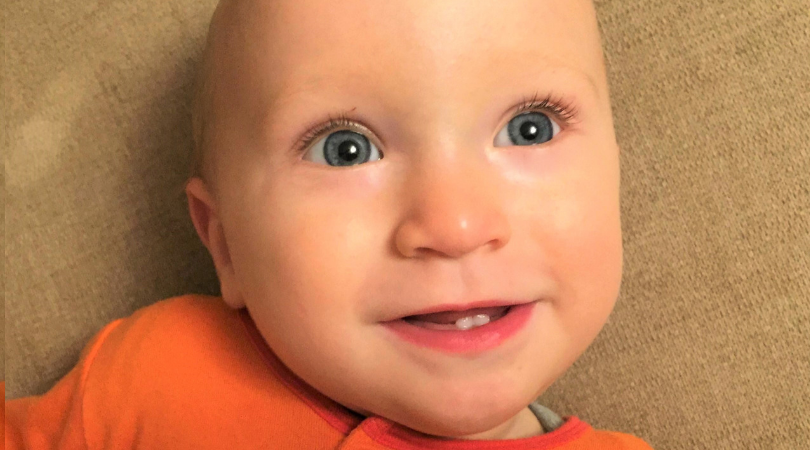
Is My Baby Teething?

Ahh, one of the most common questions that seems to come up in parenting groups and I’m sure it is one that is also very popular on Google too.
Is My Baby Teething?
If you are asking this, the answer is most probably yes. Don’t worry, you aren’t going crazy your little one is chewing their hand more, they are a little more grisly, they keep waking and there is definitely excess dribble! All key signs of those teeth causing problems.
Onto the next question… but isn’t he/she too young?!
No. That is the only answer you need to hear. Do not pay any attention to those people who say that teething starts at 6 months. Yes, the average age that a baby gets their first tooth is 6 months BUT we are not talking about a tooth appearing as soon as these symptoms begin, oh no… Nope the teething process starts looooong before you will see any glimmer of a first tooth. But fun fact, babies can actually be born with teeth so next time somebody tells you you’re wrong just remind them of that fact!

So, now we have covered those little things, what’s next for you?
Ummm, in a nutshell, there will be pain, there may be little sleep, there most certainly will be far too much dribble for you to cope with, there may be a bit of sickness, red cheeks, swollen gums, nappy rash and a hell of a lot of chewing!
However, these can all be managed. Teething sucks, that is a given but it doesn’t need to take over your life if you learn to observe the symptoms, react to them in time and work out which remedies help your baby.
If you are a new parent, there are a multitude of products on the market that may or may not help your baby. It is a bit confusing, it can be overwhelming, you will be posting in parenting groups asking for advice on every single one… but really the only way to find out what is best is by trial and error. Each baby is different. My friends raved about Ashton and Parson’s teething granules but I personally found Nelson’s Teething Granules the best for both my children. Some people told me about Anbesol liquid. It didn’t work for Jake, but the gel has done for William. Some parents will swear by Amber jewellery, others will tell you it’s all in your head. No matter what others say, you just need to work out what does the job for your little one.
Look for the symptoms your baby is displaying. In my book, I talk about 22 of them, yes, really! I believe that there are many links and many symptoms (some lead to others such as excess dribble leads to nappy rash) but obviously not every baby will have all of them. One of the biggest queries during this time is how to help a teething baby sleep and this is a really important one because without sleep, teething can feel worse for everybody. Providing a calming bedtime routine with a warm bath, baby massage, music and pain relief is essential. You could also keep the room at a comfortable temperature, use soft bedding, and consider offering a favourite stuffed toy or blanket for added comfort and security.

You need to identify them and react accordingly. For instance, if they are in real pain do give that Nurofen or Calpol because if you had toothache you wouldn’t sit there in pain, would you? If they are stressed, try some teething granules. If they are chewing very hard on their hands, provide a teething toy. If they are dribbly and you are concerned about a rash, keep it clean, dry and try a dribble bib. If you are extremely worried, seek medical advice because at the end of the day teething is a problem and it can really upset even the happiest of babies.
But once the tooth comes it will all stop won’t it?
Sorry, to be the bearer of bad news but no. Your baby gets 20 of these bad boys and certain teeth are worse than others. For Jake, the canines and molars were the extremely painful ones but William has just got his very first incisor and he found it incredibly painful so I’m not holding out much hope of the rest being any better. Yes, you may get a lull for a while and as some children don’t get all of their teeth until they are three, the teething issues can be spaced out but they may not go away for long. Which is why I say to learn precisly what works for your baby. What soothes them? What calms them? What hits their pain fastest? The sooner you can crack this side, the easier the process will be for you.
I have written a few posts over the last couple of years on this subject but most recently I have covered what my teething essentials are, which is a great post if you are just starting to research this development.
My Top Tips
- Do your research
- Take your time to look at what is available on the market
- Identify the teething symptoms
- Try a variety of products until you get it right
- Provide plenty of cuddles, comfort and love
- Distraction can work wonders!
- Get out and about
- Don’t be hard on yourself. If you are tired, ask for help so you can take a nap
- Remember that everyone else is going through the same thing and talking can really help
- Do what you need to do to get through the worst times… oh and never feel judged for doing it!!
If you need more advice feel free to drop me a comment or why not follow me on Facebook too?

Pin for later:





